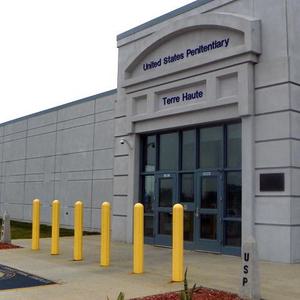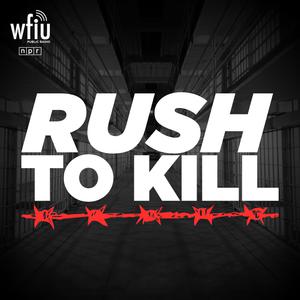
The Federal Bureau of Prisons spent nearly $4.7 million dollars on the first five executions carried out by the Trump administration in July and August 2020, according to redacted government financial records recently obtained by the ACLU.
The government’s January 2021 disclosures in response to an ACLU Freedom of Information Act lawsuit, detailed the extraordinarily high price tag absorbed by taxpayers as a result of the administration’s choice to conduct executions during the worst global pandemic in more than a century. With an average annual federal incarceration cost of $37,449.00, the burden to U.S. taxpayers for each execution exceeded the price tag of incarcerating a federal prisoner for 25 years.
The bulk of the expenditures were spent on payments relating to assembling, transporting, and housing multiple execution teams. The BOP paid round-trip travel and related expenses to bring dozens of staff to Terre Haute from more than 20 out-of-state prisons for training, to perform daily functions normally undertaken by Terre Haute staff, and to participate in the executions. The documents identified $3.1 million in unidentified costs related to the new execution staff. BOP spent $107,000 on hotels for the witnesses and out-of-state staff.
Cassandra Stubbs, the director of the ACLU’s Capital Punishment Project, said the expenditures reflected “a gross misplacement of resources.” Pointing to heavy redactions in the disclosed record, she said that the nearly million dollar per execution price tag likely significantly understates the actual costs. “The government is doing so much of this in the dark, so we don’t always get to see the full weight of what it’s up to,” Stubbs said. “They’re willing to go to extraordinary lengths in terms of spending our money and then hiding the footprints of it.”
BOP officials declined to answer media questions on the payment records.
In a court filing in November, BOP’s regional counsel Rick Winter indicated that teams involving more than 40 employees from around the country would be assembled for the executions, removing them from their day-today functions, “which include a wide range of correctional and administrative positions within the BOP.” He indicated that the Bureau brings another 50 members of BOP Special Operations Response Teams and Disturbance Control Teams from across the country to Terre Haute for enhanced security during the executions. BOP also paid private contractors to provide unspecified services in connection with the executions.
The execution costs included the increased expenses for security and running the rest of the prison while the executions were taking place. A lack of prison staff at Terre Haute, which Stubbs attributed to the pandemic, meant that guards had to be pulled away from their usual duties during the executions, sending the prison into semi-lockdown. During these lockdowns, alternative brown-bag meals were provided to the around 2,600 prisoners at an increased cost.
While BOP paid for staffing costs and travel and housing expenses for the families of the victims, it did not make similar expenditures for the families of the indigent prisoners who were being executed. Lisa Brown, whose son Christopher Vialva was executed in September, told The Marshall Project, “What they pay for on our side is the shipping of the body of our loved ones, the embalming, a suit for them to wear and the casket.” Brown was forced to take out a loan to be able to be present to support her son at his execution, she said. Her congregation and her son’s friends pooled together donations to pay for her gas and hotel room. After her son’s death, she said that “We feel that they go out of their way to not accommodate us.”
The federal government has been the only U.S. jurisdiction to carry out executions since early July 2020, and it, like the two states that carried out executions early in the pandemic, experienced a COVID-19 outbreak following the executions. “There was no need to restart executions and certainly no need to carry out so many executions during a pandemic when each execution brings together and poses an enormous risk to so many circles of people,” Stubbs said.
Stubbs criticized the administration’s priorities during the pandemic, saying they represented “a gross misplacement of resources at a time when there are staffing shortages, crises and lack of personnel because so many BOP staff are becoming sick.” Instead of protecting public health, Stubbs said, BOP decided “that they’re going to double down and pull desperately needed staff to carry out executions and potentially make more individuals sick and unable to go to work — and to do it all on the taxpayer dime.”
If the cost of carrying out the eight other federal executions in November and December 2020 and in January 2021 are comparable to the first five executions, the federal executions will have cost taxpayers at least $12.2 million dollars. That figure does not include the cost of the extensive litigation over the legality and constitutionality of the executions in each of the cases.
Keri Blakinger and Maurice Chammah, A $6,300 bus. A $33 last meal. What New Documents Tell Us About Trump’s Execution Spree, Marshall Project, January 14, 2021; Khaleda Rahman, Trump admin spent millions carrying out federal executions in a pandemic, Newsweek, January 14, 2021; Joe Davidson, President Trump’s expensive death penalty binge could continue next week, Washington Post, January 9, 2021.
Federal Death Penalty
Dec 09, 2024

Religious Groups, Former Corrections Officials, Pro-life Voices, and Many Others Urge President Biden to Commute Federal Death Sentences
Federal Death Penalty
Jan 09, 2024

Federally Death-Sentenced Prisoners Allege that New Conditions of Confinement Contributed to Recent Prisoner Death
Federal Death Penalty
Oct 23, 2023
